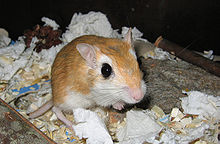The pale gerbil (Gerbillus perpallidus) is endemic to Egypt and is distributed mainly in the northwestern part of the country. It is also known as the pallid gerbil. The pale gerbil has pale orange fur, with white underparts, white forelimbs and white feet. The ears are unpigmented and the soles of the feet are haired, which is a characteristic of sand-dwelling gerbils.[2]
| Pale gerbil | |
|---|---|

| |
| Scientific classification | |
| Domain: | Eukaryota |
| Kingdom: | Animalia |
| Phylum: | Chordata |
| Class: | Mammalia |
| Order: | Rodentia |
| Family: | Muridae |
| Genus: | Gerbillus |
| Species: | G. perpallidus
|
| Binomial name | |
| Gerbillus perpallidus Setzer, 1958
| |
It averages 22 to 27 cm in length, and weights 26-49 g.[2]
As pets
editThe pale or pallid gerbil, usually shortened to pallid by enthusiasts, is recommended as a good second species for those with experience of keeping Mongolian jirds (gerbils).
References
edit- ^ Aulagnier, S.; Schlitter, D.; Granjon, L. (2008). "Gerbillus perpallidus". IUCN Red List of Threatened Species. 2008: e.T9140A12964460. doi:10.2305/IUCN.UK.2008.RLTS.T9140A12964460.en. Retrieved 12 November 2021.
- ^ a b Gerbillus perpallidus Archived 2013-12-03 at the Wayback Machine ARKive
- Aulagnier, S.; Schlitter, D.; Granjon, L. (2008). "Gerbillus perpallidus". IUCN Red List of Threatened Species. 2008: e.T9140A12964460. doi:10.2305/IUCN.UK.2008.RLTS.T9140A12964460.en. Retrieved 12 November 2021. Database entry includes a brief justification of why this species is of least concern
